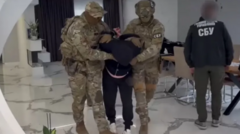Despite their appearances of strong friendship, Xi and Putin's relationship reflects a complex interplay of cooperation and competition that could affect broader international alliances.
Xi and Putin: A Delicate Dance of Diplomacy

Xi and Putin: A Delicate Dance of Diplomacy
Chinese leader seeks camaraderie with Russian counterpart while balancing global relations.
Chinese President Xi Jinping showcased a seemingly unwavering bond with Russian President Vladimir Putin during Moscow's Victory Day parade, taking a prominent position beside him as their troops marched in unison. Xi deemed the relationship between their nations as "unbreakable," expressing the notion that Russia and China should be viewed as "friends of steel." This marks Xi's 11th visit to Russia since he took office in 2013, highlighting a robust, albeit complicated partnership characterized by over 40 meetings between the two leaders, including the rare public embrace they shared in the past.
However, the camaraderie displayed masks deeper intricacies, as analysts point out that this union involves a mingling of mutual interests and latent rivalries. As Mathieu Boulegue from the Center for European Policy Analysis explained, while visible gestures of friendship abound, there exists a nuanced reality driven by political maneuvering on both sides. Xi's role is particularly delicate as he navigates a landscape where Russia's global stature has diminished due to its ongoing conflict in Ukraine, rendering it an international outlier.
China's strategic positioning requires care; while it values its connection with the Russia, it also pursues relationships with European nations to reduce isolation, especially against the backdrop of economic tensions with the United States. Beijing has been actively courting Europe, especially in light of the recent messages exchanged between Xi and European leaders celebrating the 50th anniversary of their diplomatic ties.
Despite China's steadfastness, Xi is acutely aware of the repercussions that could arise from a partnership perceived as too close with the Kremlin, particularly as many in Europe seek to distance themselves from Russia's actions. Xi's stance evidently aims to counter any assumptions that the U.S. could leverage tensions between Russia and China, aiming to solidify the notion of their alliance against perceived Western hegemony.
As Xi and Putin collectively position themselves as alternatives to Western dominance, the complexities in their relationship reveal deeper fissures. The ongoing war in Ukraine has notably diminished Russia’s economic strength and reliance on China, a dynamic that could alter the balance of their relationship. Analysts suggest that the partnership now leans more heavily in favor of China, as Putin may find himself more dependent on Xi than ever before.
While public displays of unity remain celebrated, the duo’s alliance teeters on the brink of potential discord, signaling that while they may present a united front today, the future may bring challenges that test the very fabric of their ties.





















